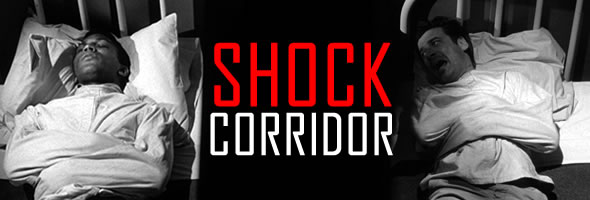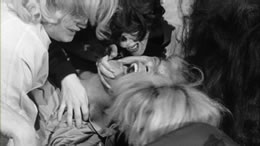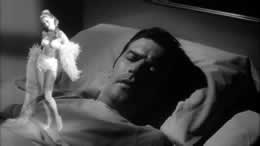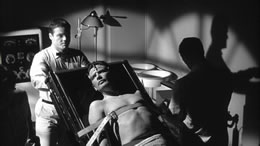
B&W, 1963, 101m.
Directed by Samuel Fuller
Starring Peter Breck, Constance Towers, Gene Evans, James Best, Hari Rhodes, Larry Tucker
Criterion (Blu-Ray & DVD) (US HD/NTSC RA/R1) / WS (1.78:1) (16:9)

B&W, 1963, 101m.
Directed by Samuel Fuller
Starring Peter Breck, Constance Towers, Gene Evans, James Best, Hari Rhodes, Larry Tucker
Criterion (Blu-Ray & DVD) (US HD/NTSC RA/R1) / WS (1.78:1) (16:9)
 Following a string of distinctive war, western, and crime films, director Samuel Fuller broke away from the studio system by writing and directing a pair of films so bizarre, striking, and stylistically extreme that they still feel years ahead of their time. Both also wound up being distributed by Allied Artists and took years to really gain a cult following, though now are both regarded as cult classics. The second was The Naked Kiss, but before it was Shock Corridor, one of the earliest and best entries in the "sane guy plays crazy" subgenre which later included 1965's Brainstorm and, most famously, 1975's One Flew over the Cuckoo's Nest. However, Fuller's own "tabloid style" approach makes Shock Corridor a standout work all by itself.
Following a string of distinctive war, western, and crime films, director Samuel Fuller broke away from the studio system by writing and directing a pair of films so bizarre, striking, and stylistically extreme that they still feel years ahead of their time. Both also wound up being distributed by Allied Artists and took years to really gain a cult following, though now are both regarded as cult classics. The second was The Naked Kiss, but before it was Shock Corridor, one of the earliest and best entries in the "sane guy plays crazy" subgenre which later included 1965's Brainstorm and, most famously, 1975's One Flew over the Cuckoo's Nest. However, Fuller's own "tabloid style" approach makes Shock Corridor a standout work all by itself.
 When he learns of a frustrated police investigation into a murder committed within the walls of a mental institution, journalist Johnny Barrett (The Big Valley's Breck) smells a possible Pulitzer and decides to have himself committed in order to extract information from the three insane witnesses. He bids farewell to his burlesque dancer girlfriend Cathy (Towers, future Naked Kiss star), and gets committed by pretending that he's harboring obsessive erotic desires for Cathy, whom he passes off as his sister. The three potential witnesses prove to be more than a handful: a deranged southern soldier (The Dukes of Hazzard's Best) whose dark past involving the Korean War has him convinced he's a general; a black college student (Rhodes) who thinks he's turned into a white supremacist; and brilliant physicist (Evans) who's backpedaled into borderline infancy. Thanks to other colorful characters including an entire ward of clawing female sex freaks and orderlies with a fondness for electroshock therapy, Johnny's sanity really does begin to crack under all the pressure as he scrambles for his big break.
When he learns of a frustrated police investigation into a murder committed within the walls of a mental institution, journalist Johnny Barrett (The Big Valley's Breck) smells a possible Pulitzer and decides to have himself committed in order to extract information from the three insane witnesses. He bids farewell to his burlesque dancer girlfriend Cathy (Towers, future Naked Kiss star), and gets committed by pretending that he's harboring obsessive erotic desires for Cathy, whom he passes off as his sister. The three potential witnesses prove to be more than a handful: a deranged southern soldier (The Dukes of Hazzard's Best) whose dark past involving the Korean War has him convinced he's a general; a black college student (Rhodes) who thinks he's turned into a white supremacist; and brilliant physicist (Evans) who's backpedaled into borderline infancy. Thanks to other colorful characters including an entire ward of clawing female sex freaks and orderlies with a fondness for electroshock therapy, Johnny's sanity really does begin to crack under all the pressure as he scrambles for his big break.
Definitely not the most uplifting view of psychiatry on film (Scientology conventions would probably love it), Shock Corridor is a bold, bizarre filmic black and white experiment featuring jarring color inserts for fantasy sequences (actually travelogue outtakes from Fuller's House of Bamboo) and some wild, expressionistic cinematography courtesy of the great Stanley Cortez (not too far off from his brilliant work on The Night of the Hunter). As usual with Fuller films of this period, it's hard to really assess the actors since they're all working in a completely alien mode from what most viewers expect; the florid dialogue and extreme performances edge close to kabuki at times but somehow all coalesce into the film's eccentric fabric.
 As with The Naked Kiss, this was one of Criterion's earlier titles to come out on laserdisc (way before it even hit VHS) and has been rehashed a few times, including a non-anamorphic DVD from Criterion, an open matte release in France (which really falls apart during those anamorphically squeezed dream sequences), and a few other oddball iterations indicating this may be quasi-public domain. Fortunately it's been given its first really respectable presentation courtesy of Criterion's Blu-Ray, which is a huge step up in quality. The framing looks accurate, and the details visible in even the darkest scenes easily blow away past video versions (not to mention the few surviving film prints, if you're ever lucky enough to see it projected). The uncompressed mono soundtrack sounds great all around.
As with The Naked Kiss, this was one of Criterion's earlier titles to come out on laserdisc (way before it even hit VHS) and has been rehashed a few times, including a non-anamorphic DVD from Criterion, an open matte release in France (which really falls apart during those anamorphically squeezed dream sequences), and a few other oddball iterations indicating this may be quasi-public domain. Fortunately it's been given its first really respectable presentation courtesy of Criterion's Blu-Ray, which is a huge step up in quality. The framing looks accurate, and the details visible in even the darkest scenes easily blow away past video versions (not to mention the few surviving film prints, if you're ever lucky enough to see it projected). The uncompressed mono soundtrack sounds great all around.
Criterion's new extras include the excellent 1996 documentary The Typewriter, the Rifle and the Movie Camera (an hour-long look at Fuller's work and life featuring much input from the man himself along with admirers like Martin Scorsese and Jim Jarmusch. Along with the hilariously overwrought theatrical trailer, you get a new(ish) half-hour 2007 video interview with Towers (from the same session as her Naked Kiss chat) in which she talks more about working with Fuller and his directorial tactics compared to some of her other collaborators over the years. The thick liner notes booklet includes some snippets from Fuller's autobiography about the film and a Robert Polito essay.
![]()